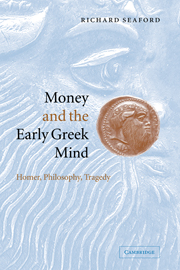Book contents
- Frontmatter
- Contents
- Preface
- List of abbreviations
- 1 Introduction
- PART ONE THE GENESIS OF COINED MONEY
- 2 Homeric Transactions
- 3 Sacrifice and distribution
- 4 Greece and the ancient Near East
- 5 Greek money
- 6 The preconditions of coinage
- 7 The earliest coinage
- 8 The features of money
- PART TWO THE MAKING OF METAPHYSICS
- References
- Index
3 - Sacrifice and distribution
Published online by Cambridge University Press: 22 September 2009
- Frontmatter
- Contents
- Preface
- List of abbreviations
- 1 Introduction
- PART ONE THE GENESIS OF COINED MONEY
- 2 Homeric Transactions
- 3 Sacrifice and distribution
- 4 Greece and the ancient Near East
- 5 Greek money
- 6 The preconditions of coinage
- 7 The earliest coinage
- 8 The features of money
- PART TWO THE MAKING OF METAPHYSICS
- References
- Index
Summary
HOMERIC SACRIFICE: SUBJECTIVE CONTINUITY
The Homeric ideology that marginalises the growth of trade and monetisation (2bc) does nevertheless register the fatal instability of the old centralised reciprocity (2d), and respects the tradition of communal distribution embodied in animal sacrifice (2e). In the historical transition refracted in Homer it will be this model of sacrificial distribution that will eventually predominate – no longer confined, as in Homer, to the distribution of meat, but incorporating (we shall see in this chapter) the more valuable and durable goods that in Homer occupy a separate sphere of exchange and distribution.
Whence the power of this sacrificial model? There is no doubt of the economic centrality, from the beginnings of homo sapiens, of the act of killing an animal, first in the hunt, and then, relatively recently, in the sacrifice of domesticated animals. The survival of the group depends not only on power over the animal but also on an agreed mode of distributing the flesh. And yet the act of killing and eating is in itself transient. It may, despite the emotion of the dramatic killing and of the collective participation in the meal, leave no physical trace of itself. The consequent vital need for continuity may be expressed in three ways: (a) in the continuity of deity, who remains to demand the same form of sacrifice at regular intervals or in specific circumstances; (b) in the subjective continuity of the human insistence that in the future the animal be killed and distributed in the same way; (c) in continuity of an established object or place (altar, shrine, temple), in which the preservation of the durable part of the animal, or of the implements of sacrifice, may be a first step.
- Type
- Chapter
- Information
- Money and the Early Greek MindHomer, Philosophy, Tragedy, pp. 48 - 67Publisher: Cambridge University PressPrint publication year: 2004



